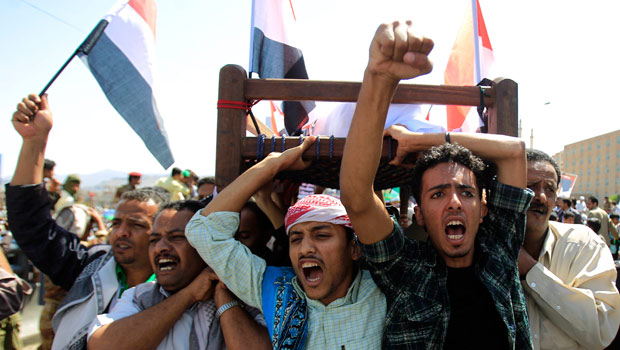Clashes between government forces and soldiers backing a protest movement seeking to unseat autocratic President Ali Abdullah Saleh reached the doorsteps of the US and British embassies in Sanaa, witnesses said.
At least four soldiers — two on each side — were reported killed in the intensifying battles.
A protester was killed and at least eight wounded by snipers just off “Change Square.” Angry protesters set fire to a house where they said snipers were hiding, while medics set up a blood donation campaign for the wounded.
Yemen will be torn apart unless a political solution is reached soon between opponents of Saleh and his supporters, the UN envoy to the impoverished Arabian Peninsula country said.
Saleh has been in nearby Saudi Arabia since June to recover from wounds suffered in an assassination attempt, leaving Yemen in tense political limbo that on Sunday exploded into a full-blown military showdown that has so far killed 86 people.
“Unless there is a deal, or unless there a breakthrough to a political solution ... the country will continue to fall apart and violence will spread to other parts of the country,” United Nations envoy Jalal bin Omar told Reuters in an interview.
“It’s very urgent that Yemenis make up their mind and agree on a reasonable way forward.”
Hopes are fading that a lasting cease-fire between government troops and soldiers loyal to a top general who defected from Saleh in March can be brokered to enable a mediated accord for him to cede power to launch a reform process.
A truce called by Yemen’s vice president earlier this week broke down in just a few hours.
“There are some initiatives being discussed for a political solution under the supervision of Jamal bin Omar and we hope these efforts succeed. Their failure will push this country into more violence,” a high-ranking Yemeni opposition official said.
Yemen’s bloody deterioration is causing alarm abroad because central governance has unraveled, leaving a gun-ridden power vacuum filled by Al-Qaeda militants and separatist factions near vulnerable oil shipping lanes in the Red Sea and Gulf of Aden.
More than 400 have been killed since a revolt against 33 years of autocratic Saleh family rule began in January.
Escalating confrontation between heavily armed supporters of Saleh and his opponents points to the worst-case scenario for diplomats struggling to finalize the power handover deal while Saleh convalesces in Riyadh.
Lawlessness could also give fertile ground to Al-Qaeda, whose militants in the past few months have seized cities in a province just east of a key oil shipping channel.
Saleh has backed out of a Gulf-brokered plan to hand over power three times, nudging the country closer to civil war.
This week, Gulf Cooperation Council Secretary General Abdullatif Al-Zayani flew into Sanaa to try and resurrect the deal but left empty-handed after two days.
That initiative would see Saleh leave office a matter of months after signing it.
“The only way forward is a political solution, a political process that is inclusive,” Bin Omar said.
“We want all the political factions and trends to participate so that we are not in a situation where there not only two sides. There are too many political actors and they will need to participate in this process.”










